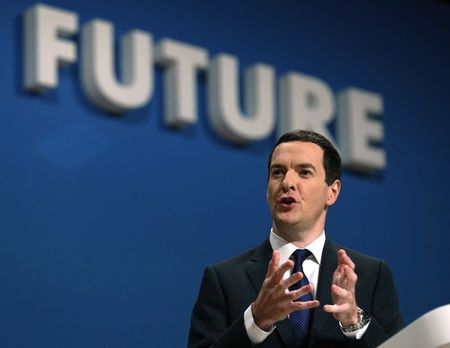By David Milliken and Li-mei Hoang
LONDON (Reuters) - British government borrowing rose more than 10 percent in the first half of the financial year, giving Chancellor George Osborne little scope to offer sweeteners to voters before a parliamentary election in May.
Osborne said in March he would aim to reduce the budget deficit by more than 10 percent over the following 12 months, helped by Britain's fast-recovering economy. But Tuesday's official data make that target look out of reach.
The opposition Labour party lost no time in using the figures to attack Osborne who originally planned, after taking office in 2010, to largely get rid of the deficit by 2015.
"These figures are a serious blow to George Osborne," Labour's finance spokesman Chris Leslie said in a statement.
"Not only is he set to break his promise to balance the books by next year, but borrowing in the first half of this year is now 10 per cent higher than the same period last year."
Britain's economy has staged a stronger-than-expected recovery since the middle of 2013. But that has not yet translated into a big increase in tax revenues, in large part because slow wage growth has kept a lid on income tax receipts.
Economists said Osborne would be unable to offer much to voters when he presents a half-yearly budget update on Dec. 3.
"(He) looks set to be forced to acknowledge ... that the fiscal consolidation is not going to plan. Accordingly, the scope for the coalition parties to announce pre-election sweeteners to improve their chances of re-election has all but disappeared," said Samuel Tombs of Capital Economics.
A finance ministry spokesman said Tuesday's figures showed "the impact of the great recession is still being felt in our economy and the public finances ... we have to recognise that the UK is not immune to the problems being experienced in Europe and other parts of the world economy."
On the up-side, he pointed to an increase in revenues from income tax and employment insurance contributions in September, 2.3 percent higher than a year ago. However, for the year to date it was up by just 0.5 percent.
The Office for Budget Responsibilty, an independent public fiscal watchdog, said it looked increasingly likely that government revenue for the full tax year would be less than forecast in March.
WAGES LAG INFLATION
Borrowing for September was 15.3 percent higher than a year earlier at 11.8 billion pounds, the Office for National Statistics said.
That compared to economists' forecasts for the shortfall to hold roughly steady at 10.5 billion pounds.
For the first six months of the financial year, public sector net borrowing, excluding state-controlled banks, was 58.0 billion pounds, 10.3 percent higher than in 2013.
Last month's data had shown that borrowing between April and August was 6 percent higher than a year earlier.
While Britain's economy has grown faster than average so far this year, and unemployment is falling rapidly, wages are growing more slowly than inflation and the government has raised how much people can earn before they start to pay tax.
Elizabeth Martins, an economist with HSBC, noted there was only one more set of public borrowing figures due before Osborne's half-yearly budget statement.
"So (he) may well find himself in the position of revising up the borrowing projections in spite of the better growth and labour market outturns," she said in a note to clients.
Total government revenue was down by 0.4 percent in the first half of the tax year, and the only bright spot was receipts from property and share transaction taxes, up by more than a third on the year.
Exact comparisons between the government's budget plans and actual borrowing are difficult as since last month the ONS has been using a new method for calculating the headline measure.
Borrowing on the old basis was forecast in March to fall to 5.5 percent of gross domestic product in the 2014/15 tax year from 6.6 percent in 2013/14. Revisions to GDP and other changes mean that on the new measure, 2013/14 borrowing is now estimated to have been 5.7 percent of GDP.

Public sector net debt excluding state-controlled banks totalled 1.451 trillion in September, matching June's record high of 79.9 percent of GDP.
(Writing by David Milliken and William Schomberg; Editing by Robin Pomeroy)
